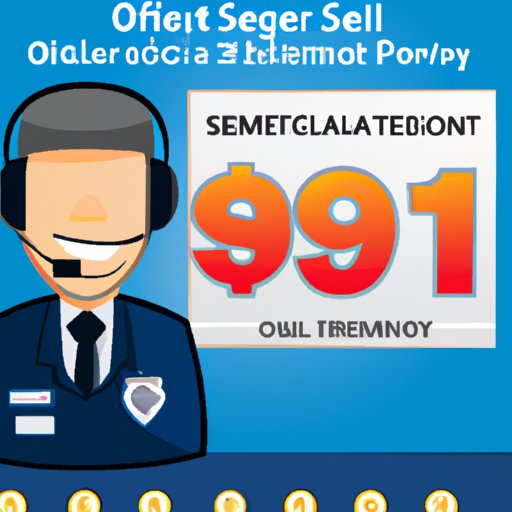Introduction
The job of a 911 operator is both demanding and rewarding. As the first point of contact for people in emergency situations, they provide invaluable assistance to those in need. But how much does a 911 operator make?
A 911 operator, also known as a public safety telecommunicator, is responsible for answering incoming calls from the public, dispatching police, fire, and medical personnel, and providing pre-arrival instructions to callers. The average salary of a 911 operator varies depending on location, experience, and other factors.
Detailed Look at the Average Salary of a 911 Operator
According to the Bureau of Labor Statistics, the median annual wage for telecommunications equipment operators, including 911 operators, was $42,420 in May 2019. This means that half of all 911 operators earned more than this amount, while the other half earned less.
In addition to their base salary, many 911 operators receive additional compensation in the form of overtime pay, shift differential pay, and other forms of compensation. The amount of overtime pay and other additional compensation can vary significantly depending on the individual’s employer and type of work.
The starting salary for a 911 operator is typically between $30,000 and $40,000 per year. However, experienced 911 operators can earn significantly more, with some earning salaries of up to $70,000 per year.

Breakdown of Salaries for 911 Operators Across the Nation
The average wages for a 911 operator in the United States vary by state and city. According to Glassdoor, the average salary for a 911 operator in New York City is $54,867 per year; in Los Angeles, the average salary is $50,393 per year; and in Chicago, the average salary is $47,918 per year.
Salaries for 911 operators also vary by experience level. According to PayScale, entry-level 911 operators with 1 to 4 years of experience typically earn an average salary of $38,563 per year. Experienced 911 operators with 5 to 9 years of experience typically earn an average salary of $45,453 per year, while those with 10 to 19 years of experience typically earn an average salary of $53,913 per year.
In addition to geographic location and experience level, other factors such as type of employer, education level, and certifications can also affect a 911 operator’s salary. For example, 911 operators who are employed by state governments typically earn higher salaries than those who are employed by local governments.
Is Being a 911 Operator Financially Worth It?
When considering whether or not to become a 911 operator, it is important to weigh the financial benefits of the job against the potential drawbacks. On the one hand, 911 operators can expect to earn competitive salaries and receive additional compensation in the form of overtime pay and other benefits. On the other hand, the job can be stressful and demanding, and there may be periods of slow business.
It is also important to consider the long-term financial benefits of becoming a 911 operator. With experience, 911 operators can advance to higher-paying positions such as supervisors or dispatchers. Additionally, many 911 operators receive benefits such as health insurance, retirement savings plans, and paid vacation days.
Conclusion
Working as a 911 operator can be both rewarding and financially beneficial. The average salary of a 911 operator varies depending on location, experience, and other factors, but most 911 operators can expect to earn competitive salaries and receive additional compensation in the form of overtime pay and other benefits. Additionally, there are long-term financial benefits to becoming a 911 operator, such as advancement opportunities and benefits packages.
Overall, becoming a 911 operator can be a financially worthwhile career choice for those who are dedicated to helping others in times of crisis.
(Note: Is this article not meeting your expectations? Do you have knowledge or insights to share? Unlock new opportunities and expand your reach by joining our authors team. Click Registration to join us and share your expertise with our readers.)
